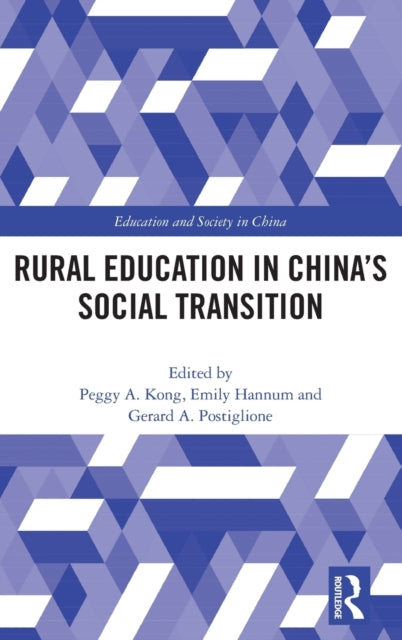Shulph Ink
Rural Education in China's Social Transition
Rural Education in China's Social Transition
YOU SAVE £7.68
- Condition: Brand new
- UK Delivery times: Usually arrives within 2 - 3 working days
- UK Shipping: Fee starts at £2.39. Subject to product weight & dimension
Bulk ordering. Want 15 or more copies? Get a personalised quote and bigger discounts. Learn more about bulk orders.
Couldn't load pickup availability
- More about Rural Education in China's Social Transition
This book investigates the interplay between China’s social, economic, and educational policy changes, its rural households and urban communities, focusing on the resource-constrained rural environments, limited knowledge networks, and urbanization of parent support, student engagement in learning, teacher and student retention.
Format: Hardback
Length: 256 pages
Publication date: 18 December 2020
Publisher: Taylor & Francis Ltd
In the early 2000s, China experienced a period of rapid economic growth and expansion that significantly impacted the educational landscape of its children. The country's economy grew at an unprecedented rate, leading to increased prosperity and educational opportunities for children from all backgrounds. However, this period of growth also brought about rising inequality, with the children of the emerging urban middle and elite classes enjoying new prosperity while those from persistently poor rural communities continued to face numerous challenges.
One of the most significant challenges faced by rural children was food insecurity. Many families in rural areas struggled to provide enough food for their children, leading to poor nutrition and increased susceptibility to illness. Illnesses such as malnutrition and respiratory diseases were prevalent among rural children, often due to a lack of access to proper healthcare and nutritious food.
Another challenge was the hardship of family separation. As parents sought better economic opportunities in urban areas, they often left their children behind in rural communities. This separation not only caused emotional distress for the children but also made it difficult for them to access education, as they were often required to travel long distances to attend school.
Migrant life on the margins of cities was also a challenge for rural children. Many children from rural areas were forced to leave their homes and move to urban areas in search of work, often without proper documentation or legal protections. These children faced discrimination, exploitation, and limited access to education and healthcare.
The resource gap between poor rural children and their wealthier urban counterparts also emerged during this period. Poor rural children often lived in inadequate housing conditions, lacked access to clean water and sanitation facilities, and had limited access to educational resources such as textbooks and computers. In contrast, their urban counterparts had access to better housing, quality healthcare, and a wealth of educational opportunities.
To address these challenges, the Chinese government implemented various policies aimed at extending full educational access to rural children. These policies included building new schools in rural areas, providing scholarships to rural students, and implementing programs to improve the quality of education in rural schools. However, these policies faced numerous challenges, including a lack of funding, inadequate infrastructure, and cultural and linguistic barriers that hindered the integration of rural children into the school system.
This book seeks to highlight the complexities China has experienced in seeking to extend full educational access to rural children, including rural-to-urban migrant and ethnic minority children, during a momentous period in China's history. The chapters in this book delve into the experiences, perceptions, strategies, and difficulties faced by rural-origin children and their families in the school system. They also lay bare the challenges of policy initiatives designed to support rural education.
We hope that the experiences detailed here will be of interest to students and scholars of rural educational policy and practice in China and worldwide. By understanding the challenges faced by rural children, we can work towards creating a more equitable and inclusive education system that ensures all children have access to quality education, regardless of their background or location.
Weight: 524g
Dimension: 159 x 242 x 23 (mm)
ISBN-13: 9781138681408
This item can be found in:
UK and International shipping information
UK and International shipping information
UK Delivery and returns information:
- Delivery within 2 - 3 days when ordering in the UK.
- Shipping fee for UK customers from £2.39. Fully tracked shipping service available.
- Returns policy: Return within 30 days of receipt for full refund.
International deliveries:
Shulph Ink now ships to Australia, Belgium, Canada, France, Germany, Ireland, Italy, India, Luxembourg Saudi Arabia, Singapore, Spain, Netherlands, New Zealand, United Arab Emirates, United States of America.
- Delivery times: within 5 - 10 days for international orders.
- Shipping fee: charges vary for overseas orders. Only tracked services are available for most international orders. Some countries have untracked shipping options.
- Customs charges: If ordering to addresses outside the United Kingdom, you may or may not incur additional customs and duties fees during local delivery.


